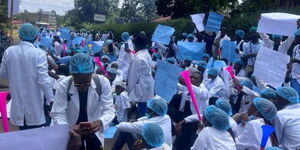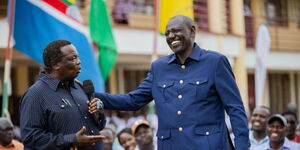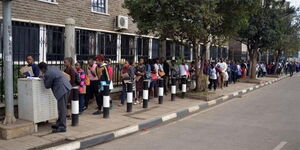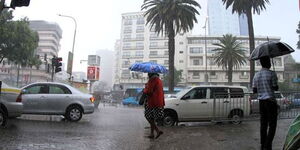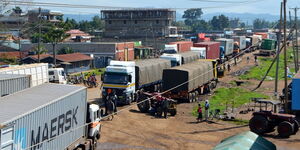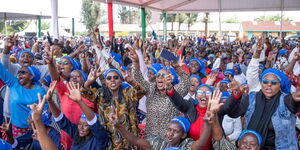SPEECH BY HIS EXCELLENCY HON. UHURU KENYATTA, C.G.H., PRESIDENT OF THE REPUBLIC OF KENYA AND COMMANDER-INCHIEF OF THE DEFENCE FORCES DURING THE MASHUJAA DAY STATE ADDRESS ON, 20TH OCTOBER, 2021 DISTINGUISHED GUESTS, MY FELLOW KENYANS, HAPPY MASHUJAA DAY!
Let me at the outset begin by thanking you, the people of Kirinyaga, for your hospitality and warm welcome to this beautiful County, at the footsteps of Mount Kenya. Fellow Kenyans, This is the tenth time we are celebrating our nationhood, identity, and diversity away from the capital city of Nairobi. We have previously marked National Days in the following other Counties: Kisumu, Kisii, Nakuru, Kakamega, Narok, Nyeri, Machakos, Meru and Mombasa.
Today we gather here in the county of Kirinyaga, to celebrate the Makers of our Nation. We celebrate all the men and women who laid the foundation stones of our nation. We also commend all those Kenyans who made and continue to make extraordinary contributions to bring our nation closer to her destiny of being a better, more just, more equitable, and more prosperous nation for all. At Independence, the Makers of our Nation sought to secure a nation devoid of exclusion, disunity and oppression.
Through their hard work, dedication, and sacrifice; today we are a thriving democracy. That generation of nation builders chose hope over pessimism, unity over divisionism, faith over fear, and 2 purposeful sacrifice over narrow interests of the day.
When they encountered obstacles, they reminded themselves that: “…an obstacle is what you see when you set your eye off the goal.” But like the Heroes of Faith in the Holy Scriptures, some of those men and women died without beholding our free land or realizing their promise. However, they are immortal, as they will forever live on in the pillars of the strong and free nation that they built; and in the hearts of the eternally grateful generations of Kenyans who followed from them. Mashujaa Day is their day; and it is also our day to remember them, to celebrate them, and renew our commitment to the values upon which our beloved nation was founded.
Fellow Kenyans, Celebrating Mashujaa Day in Kirinyaga County today is significant for a number of reasons. Firstly, this County is named after the Mountain of Mystery or Kere-Nyaga. According to traditional folklore, the Mountain of Mystery was created as God’s resting place and as a Sign of His Wonder. After God created the Earth, this is where He is said to have rested on the seventh day to admire his workmanship.
This mountain, standing tall in our presence here today, was not just a place of rest and a shrine for worship. It was also a place of renewal, a place of honest conversation, and a place for bonding and reconciliation. Celebrating Mashujaa Day in Kirinyaga County has a second historical significance.
This county bears the name of the Mountain of Mystery, and so is our nation. And according to folklore, the naming came from one of our pioneer heroes called Chief Kivoi wa Mwendwa, born 240 years ago in 1780. 3 One of the early colonizers who befriended Chief Kivoi was Dr. Ludwig Krapf, a German Missionary from the Anglican Church Missionary Society (CMS).
On December 3rd, 1849, Chief Kivoi brought Dr. Krapf to Kirinyaga to behold the Mountain of Mystery. When asked, through an interpreter what the name of the mountain was, Chief Kivoi told the colonizer that the name of the Mountain was Kere-Nyaga. According to the popular folklore, he pronounced it in a Kamba accent but what the colonizer heard was Kiinya. And from this conversation, the name of our nation Kenya was born, close to 200 years ago. Kirinyaga County is therefore at the heart of our rich heritage as a nation.
The development of the then Kirinyaga District created out of the western part of Embu District in 1963, has closely mirrored that of the wider country, culminating with the advent of devolution. Fellow Kenyans, The 20th of October is a significant date in our history because in 1952 this was the day that a State of Emergency was declared on our land by the colonizers, and hundreds of our Founding Fathers were arrested.
But when our Founding Fathers, led by Mzee Jomo Kenyatta, his Deputy Jaramogi Odinga Oginga, compatriots like Paul Ngei, Masinde Muliro and others, overcame the Darkness of the Emergency period, a new order emerged. They had a three-point agenda that resonates to date. They declared war on ignorance, poverty and disease. And today, the war is still on. It is a war we have inherited and one we shall also bestow on future generations.
The commitment as declared by our forefathers is a sacred obligation today and it is so from one generation to the next. 4 Mzee Jomo Kenyatta, representing the Founding Fathers, had this to say on the task at hand: ”…Our children will learn about the heroes of the past; but our task is to make ourselves the architects of the future” This is a challenge he posed to, not only his generation, but to all Kenyan generations to come.
Each generation must not focus only on past heroism; but it must also continuously strive to be the architects of their own brighter future. For us to become architects of the future, we must begin by protecting what was left behind by the heroes who liberated this country. And in particular, we were charged with the responsibility of taking care of our territorial integrity.
Since the dawn of our Republic, on many occasions, we have experienced territorial aggressions to the sanctity of our borders. Some have been driven from within and others from without. But the message of our Founding Fathers to these aggressors was simple: Not an Inch Less; Not an Inch More. And this is the message that must reverberate across the collective quarters that are bent on annexing any part of the territory known as the Republic of Kenya.
The resolve of our Founding Fathers rings as true then as it does today: Not an Inch Less; Not an inch More. We say this because we are a nation content with its bounty, and content with the splendor within our borders. Fellow Kenyans, The transformation of our security sector has been one of the most significant endeavors of My Administration.
We have added new arrows in the quivers of our national security by retooling the resources and capacity of our security agencies. This visible transformation of our security organs has been done in honour of their sacred national duty of defending our 5 sovereignty, maintaining our territorial integrity, securing our borders, and preserving our cherished freedoms and our way of life.
As an affirmation of this, today, Kenya’s police to population ratio is at its highest level in our history, and is higher than the U.N. prescribed standard. Similarly, in the last eight years we have undertaken the most consequential and expansive modernization of our military in our nation’s history.
We continue to tool and re-retool our security resources to the highest standards; so as to keep our people safe and secure and to preserve our territorial integrity in a just, fair, democratic and safe country for all. But, aside to this, we have also invested in the welfare of those charged with our security personnel, which include a review of their remuneration benefits, and other allowances, upgrade of housing, provision of insurance and increased the capacity of the health facilities used by our security personnel.
In addition, we are building four additional hospitals to cater for them and their dependents, in recognition of the heavy toll placed on them and their families. Fellow Kenyans, Ladies and Gentlemen, Now I must return to the subject of being architects of the future.
When our Founding Fathers charged us with this task, what they told us is that the future is not a destination out there waiting for us. It is a destination we create block by block. It is like an open book that you write page by page; moment by moment. But you do not realize it until you are met by unexpected challenges, like COVID-19.
And placed upon the horns of a 6 dilemma, you can either choose to see obstacles in every opportunity or opportunity in every obstacle. This, fellow Kenyans, is the foundation of any successful nation-state. It is about choices. Yet, it is in moments like this that the true character of a Nation and a People is revealed.
And I am elated to say that, with the COVID-19 crisis, our state of mind as a government has been one of finding opportunities in every problem occasioned by COVID. Instead of focusing on “what is”, we have focused on “what could be”. And this optimism by Government, coupled with a basket of stimulus instruments is what has thrusted our economy into rapid recovery.
While the global economy contracted by an average of 3.6% last year, we still managed to grow our economy by 0.3% over the same period. And this year, it is projected to grow by 6% despite of the COVID challenges. In recognition of the “Extra-Ordinary” and “Exceptional” nature of the pandemic, the Government, as the guarantor for enjoyment of social economic rights issued targeted responses to the pandemic to cushion Kenyans against the effects of the pandemic.
My Administration made various policy interventions with a view to putting money in the pockets of Kenyans. These included various tax relief, an 8-point stimulus programme of KSh. 56.8 Billion, and Kazi Mtaani to cushion our youth from COVID related un-employment and other vulnerabilities.
Today, this economic rebound is also reflected in the strong revenue performance as at the end of September 2021, with the ordinary revenue having increased by 26.8%. Fellow Kenyans, There are many other indicators that demonstrate how we took advantage of the opportunities in the problems presented to 7 us by COVID-19.
We shall elaborate further during our scheduled State of the Nation Address in Parliament. For instance, the management of the Kenya Meat Commission was replaced during the thick fog of COVID-19. The Department of Defence took one year to refurbish the Commission and re-opened it in April 2021.
I am happy to note that in six months, KMC got out of debt and increased the number of heads of cattle it slaughtered a day from 8 to 185. This is 23 times what the old KMC used to slaughter. Today, KMC is paying farmers within 72 hours for livestock delivered at the rate of KSh 185 per kilo for cattle.
In fact, the commission had paid out a total of KSh. 52 million to farmers between the months of April to September 2020. By comparison, after the new management of KMC reopened the plant in April of 2021, it has to date paid out KSh. 643 million representing an increment of over 1,200% . Another area of transformation under the COVID duress is the tea sector. The story of our tea sector is one that must be told.
This sector has been the predatory grounds for cartels for decades, but it has now been liberated and its performance has started to improve. On account of the reform measures implemented by my Administration, the price of Kenyan tea has increased by 42% in the last one year alone; and the minimum auction price of tea is now $3 per Kg the highest price on record in the last 5 years.
It is expected that our tea farmers will receive a healthy bonus at the end of June 2022, signaling a return to the good old days of “Chai Bora; Pesa Bora”. In the coffee sector, again I’m pleased to report that the determined efforts from my Administration to root out corrupt 8 co-operatives that have been predating on our coffee farmers have borne fruit.
The revitalization of New KPCU by the Government has brought healthy competition into coffee milling activities. As a result, farmers in high yielding areas like here in Kirinyaga are now receiving upwards of KSh. 100 per kilogramme for their coffee, up from an average of KSh. 25 per kilogramme in 2019. Under the first independence government, farmers were earning 50 cents per kilo.
This went up to KSh. 2.50 per Kilogramme under the second administration. The third administration took the price to an average of KSh. 20 per kilogramme. To raise this price to over KSh. 110 per Kilogramme under COVID-19 duress is indeed a remarkable accomplishment.
Milk production has been another area of focus for my Government. As part of efforts to ensure a reasonable rate of return for our dairy farmers, my Government introduced a pricing guideline. This has seen the farm gate prices increase from KSh. 27 per litre in January 2020 to a high of KSh. 40 per litre as of September 2021.
Our dairy farmers no longer have cause to pour out their milk because of low prices. On rice, I directed Kenya National Trading Corporation to purchase all the rice from Mwea and Kano Plains for onward selling to our disciplined forces, prisons services as well as our boarding schools.
I am pleased to confirm that last year, out of 6 Rice co-operatives nationally, Mwea Rice Growers Co-operative sold the most bags of rice to Government. In fact, for every 10 bags sold to Government, Kirinyaga farmers sold 7 bags. Out of this, they realized a total revenue of KSh. 1 billion. And in order to promote our rice farmers, I direct the Ministry of Agriculture to secure the continued purchase of the upcoming crop. 9 But the transformation of our health sector is probably one of the most phenomenal testimonies of how we transformed COVID obstacles into opportunities that expanded our health facilities.
In Nairobi alone, we have constructed and operationalised 15 level two and three hospitals in various informal settlements, through the Nairobi Metropolitan Services. And there are another 15 under construction. One of the unintended benefits of the Pandemic is that we have increased our ICU capacity by an impressive 502% from 108 to 651 ICU ready beds. Similarly, our total hospital bed capacity as a country has increased by 47% from 56,069 in 2013 to the current figure of 82,291 hospital beds spread throughout the country.
During the COVID-19 pandemic period, we have improved our Oxygen generation capacity in public health facilities from 3 million litres per day in March 2020, to 32 million litres per day in October 2021. We have further increased the number of reference laboratories that can test for notifiable diseases of international concern and public health importance, from one (1) single laboratory in March 2020 at the beginning of the pandemic to the current 95.
Fellow Kenyans, let me remind you that at the beginning of the pandemic early last year, we used to ship our samples for testing in South Africa and the results turnaround time would be anything from 5 days onwards. These strategic diagnostic investments have strengthened the country’s health care system especially in response to the COVID-19 pandemic; and will propel us faster towards attainment of UHC and fortify our country’s preparedness for future global health security challenges.
10 The health workforce is a key pillar of every healthcare system. Yet, many a times, it turns out to be the weakest link typically seen as a cost driver instead of an area for public and private investment in health service provision. In a bid to bridge the gap in human resources for health, the Government has progressively recruited an additional 36,900 healthcare workers in the last 9 years, nearly a 100% increment in the country’s total public health workforce which currently stands at nearly 75,000 workers.
The mid-level healthcare workers play a critical role in health service delivery throughout all the levels of care and specifically at the primary care level. To this end, we have expanded the capacity of our Medical Training Colleges to train this critical mass of health experts from 28 KMTC campuses in 2013 to the current 71 campuses spread across 44 of our 47 counties. Fellow Kenyans, My Government has put in place a comprehensive nationwide programme to upgrade selected hospitals in all the 47 counties through provision of specialized, modern, state of the art medical, diagnostic and critical care equipment.
Through the Managed Equipment Services (MES) project, whose objective is to improve access to quality specialized healthcare services throughout the country, and which is fully funded by my Government, we identified and equipped 115 hospitals with various theatre equipment, 101 hospitals with various radiological and imaging equipment, 14 facilities with ICU equipment and 54 facilities installed and commissioned renal equipment including dialysis machines.
Through this massive investment, 628,821 people have benefitted from theatre services, 385,587 people benefited from dialysis out of the 577 dialysis machines installed, 23,574 people benefited from ICU services and over 5.7 million people 11 have been served using the 22 MRI machines, 214 X-ray machines, 83 CT scanners and 229 ultra-sound equipment since 2016. All these sum investments have benefitted over six (6) million patients and saved the country a total KSh.131.5 billion.
Fellow Kenyans There are three other areas that have thrived despite the COVID dispensation. The first one is our robust infrastructure development. To celebrate the Mau Mau liberators, a 582-kilometre road, called Mau Mau Road, is under construction in their honour. This will be the single longest road constructed in Kenya since independence. It runs through Meru County from Kieni to Maraa; through Embu County from Kairuri to Irangi; through Tharaka Nithi County from Kibugua to Itugururu. And in Central Kenya, it runs from Mutithi to Kiangwachi and from Kimbibi to Mugumo Road. This is longer than the Nairobi-Mombasa highway by 140 kilometres. And it follows the war path taken by Mau Mau liberators as they fought the colonizers.
Once completed, it will be possible for dwellers of Kirinyaga to travel to Kisumu or Uganda without passing through Nairobi. Another piece of infrastructure that would make our Founding Fathers proud is the Nairobi Expressway. This is the largest expressway in Africa stretching a total of 27 kilometres. It runs from Mlolongo in Machakos County to Rironi in Kiambu County. And from Rironi, another dual carriageway, shall soon be launched that shall run all the way to Mau Summit traversing the Rift Valley.
In total, we have had 7,991 km of new tarmac roads, with an additional 4,800 km under construction. The major flagship road projects include: Isiolo-Mandera Road; Garissa-Nuno-Modogashe-Wajir Road; Lokichar-Lodwar 12 -Lokitaung-Nakodok Road; Dualling of Kenol–Sagana-Marua Road; Expansion of Mombasa–Mariakani Road; Garsen–Witu - Lamu Road; Expansion of Makupa Bridge and approach roads; Expansion of Athi River–Machakos Turnoff road; Ahero–Kisii –Isibania road; Kibwezi–Mutomo-Kitui road; Reconstruction of Kitale-Kapenguria–Lodwar–Nakadok road on the border with South Sudan.
The second area that has thrived during the last two years is the digitization of our economy as a measure of improved governance. In keeping with being architects of their own future, young people drawn from all over the Republic are the driving force behind seminal programmes that will revolutionize the way we conduct business in our nation.
This is a project that has been dearest to my heart, especially in how I have been blessed by the opportunity of engaging and seeing the potential of our young men and women when given an opportunity. I will elaborate on this in another occasion, but today permit me to focus primarily on the land sector. For 125 years, our land registry was manually managed and messy.
In fact, some of this mess was deliberate, engineered to facilitate land theft and corruption. But with the help of this youth-led team, we have begun the process of digitizing the land registry. What has surprised us, as we reference tittle deeds with geographical co-ordinates, is the historical fraud in our land sector. We have found private land titles to roundabouts in major highways and to airport runways.
And all this was because titles were issued without reference to geographical co-ordinates or what experts call geo-referencing. To stop land fraud, therefore, we are in the process of cleaning all title deeds to ensure they have a corresponding 13 geographical co-ordinate.
This will help us stamp out the fake titles and restore the sanctity of the title deed as envisioned by our Founding Fathers. A major advantage in digitizing our land registry under the system known as “Ardhi Sasa” is that where once it took you a minimum of six months to do a single land transaction; this has now been reduced to 48 hours (2 days) in the registries we have digitized.
Where once it took between one and three months to obtain an official land search, the “Ardhi Sasa” system will give you land search results in 3 to 5 minutes. And now with digitization, we have the platform to ensure that every inch of Kenya, is mapped and all areas eligible for allocation and issuance of titles have an accurate, secure and fraud-free system for issuance.
It is my belief that after digitization, issues of land titling will be sorted out once and for all. And I say so because my administration has issued 5.3 million title deeds under this manual registry in only 8 years. That is the equivalent number of title deeds issued by the colonizers and the first three administrations combined in a total of 125 years. If we have achieved 5.3 million titles in 8 years under an archaic system, how much more will we achieve under digitization?
Added to this, we have taken the independence era dream of decent affordable shelter and used policy instruments and incentives to make it a reality. One such intervention is that, anyone registered as a pensioner can withdraw up to 40% of their pension and use it to get a housing mortgage.
Additionally, we have exempted first time mortgage holders from payment on stamp duty, in addition to a range of incentives for developers who build units under the Affordable Housing Programme. 14 Further, and on digitizing our economy, in April 2013, during my first few months as President, I directed the National Treasury to conduct a detailed survey of all chargeable Government Services and to ascertain how many of those services were paid for through digital means.
The survey found that over a third of all the payments to the Government were cash-based, presenting a high opportunity for leakage and abuse of the system. In one case, 60 per cent of revenues were spent on making collections.
By launching the e-Citizen platform, in August of 2014, 350 Government services have now been migrated to the e-Citizen platform. In the 7 years since it’s inception, the e-Citizen has served 27.2 million unique customers and has collected over KSh. 87.1 Billion in revenues.
Fellow Kenyans Our forefathers' quest for a just and fair nation for all will only be truly realized when we have every single service delivered through a transparent and accountable channel. Therefore, digitization is an important part of our endeavor to improve delivery of government services.
Digitization aims to eliminate the duplication of efforts in data collection, processing, storage, and production of identification documents which has been a feature of government operations since the dawn of the Republic. Our policy interventions will also enhance the security of the current identity card through the implementation of a MicroChip Electronic Identity Card (E-ID) that mitigates against emerging security threats such as identity theft, fraud in financial transactions, and the creation of false identities that are utilized in terrorism and other major crimes.
This improved identity card will also be used as a secure travel document within the East Africa Region. 15 To those of you, who are used to analogue systems to facilitate corruption, the end is nigh notwithstanding how many court orders you procure.
To all Kenyans, for us to achieve most of these things under the COVID restrictions, I want to thank you. Without your civic responsibility, innovation and resilience, none of these would have been made possible. From very early in the COVID crisis, I appealed to you to be your brother’s keepers and to exercise restraint as we navigate through this unfamiliar enemy. And you did our country proud on this.
The vision of our forefathers was of a nation free from ignorance. The remnants of ignorance will only be uprooted from our midst when we continuously build the capacity of our citizens to remain abreast with the demands of a rapidly changing world. It is against this background that we instituted reforms in the education sector that led to the introduction of the Competency Based Curriculum (CBC).
As a mark of this seminal transition, we have 2 cohorts of children in Pre-primary and 5 cohorts of our children in primary schools who are the pioneers of this ground breaking curriculum. The Grade 5 cohort has only one year to go before they join Junior Secondary School, Grade 7. In total we note that over 8.1 million children are part of the programme. As a caring Government, and one that appreciates the solemn duty of the State to prepare every child for their destiny, we will continue enriching the curriculum to ensure that our children sharpen their talent and maximize their opportunities; in keeping with our vision for the holistic growth of every child in Kenya.
To ensure that we adequately prepare the country for the next phase of CBC, which is the Junior High School, and to further 16 facilitate the 100% transition from primary to secondary; I hereby order and direct as follows:
I. That the Ministry of Education, jointly with Ministry of Interior and The National Treasury, shall establish a framework for the construction of the over 10,000 classrooms needed to provide the additional learning space required for the 1 million new students set to join Junior Secondary;
II. That the National Treasury engages Parliament to appropriate Ksh. 8 Billion towards the construction of classrooms;
III. That the construction of the classroom be undertaken by local contractors within the vicinity of each school, so as to provide further stimulus to the local economy;
IV. That the payments for the construction of the said classrooms will be remitted directly to the contractors in their respective sub-counties. This initiative will tap into the skilled manpower within the counties, empowering locals with enhanced economic opportunities.
Fellow Kenyans, That to address the gap of the remaining 10,000 classrooms across the country, I call on all Members of Parliament to stand together in solidarity with our children by prioritizing allocation of the CDF towards school infrastructure. The timely programme provides additional momentum to My Administration’s prioritization that no child is left behind in the transition from primary to secondary school.
Fellow Kenyans, As we continue to build back better, we are witnessing remarkable recovery in the economy; with its rebound being 17 attested by all leading economic indicators. They all point to a strong economic recovery beginning in the present year. This rebound is as a result of gradual reopening of the economy especially the services sector coupled with stronger global demand. This recovery is reflected in the strong revenue performance for the Quarter ending September 2021.
As earlier indicated, ordinary revenue collection increased by 25.8% and amounted to KSh. 441.8 billion; amounting to a collection of KSh. 17 billion above the target. The first and the second stimulus packages were designed by my administration to ensure that our economy could endure the shocks occasioned by the lockdown measures implemented in the early stages of the COVID-19 pandemic.
With significant progress registered in the containment of COVID-19, it is now time to shift our focus from survival to coexisting with the disease. In that regard, my Administration will be rolling out the third financial stimulus programme, designed to accelerate the pace of our economic growth and to sustain the gains already made.
I announce therefore, that effective 1st November, 2021, New Stimulus Programme targeting the key productive and service sectors in THIRTEEN STRATEGIC INTERVENTIONS that cover: agriculture, health, education, drought response, policy, infrastructure, financial inclusion, energy, environmental conservation.
I. The first intervention is in the Tea Sub-Sector: To safeguard the gains made in the Tea Sub-Sector, I direct the National Treasury to allocate KSh. 1 Billion in support of fertilizer subsidy for our Tea Farmers.
II. The Second intervention is in the Sugar Sub-Sector: To safeguard the livelihoods of farmers within our nation’s sugar belt, I direct the National Treasury to allocate an additional KSh. 18 1.5 Billion in aid of the sugar sector, that will be appropriated towards factories maintenance and payment of farmer’s arrears.
III. The third intervention is in the Coffee Sub-Sector: In acknowledgement of the pace of the ongoing reforms on the sub-sector, I direct the National Treasury to allocate KSh. 1 Billion to the Ministry of Agriculture to be appropriated towards completion of the ongoing targeted interventions in the Coffee Sub-Sector.
IV. The fourth intervention is in the Livestock sector: Noting the effects of the ongoing drought situation, I direct the National Treasury to allocate KSh. 1.5 Billion in support of the communities affected by the ongoing drought in the ASAL counties as part of our National Livestock Offtake Programme.
V. The fifth Intervention is also in the Livestock sector: To secure a reduction in the prices of animal feeds, I order and direct the Cabinet Secretary for Agriculture, jointly with the National Treasury, to issue within seven days, a framework that will facilitate the reduction of the cost of animal and chicken feeds.
VI. The Sixth intervention is in Education: Noting the success of my Administration’s policy on 100% transition from primary to secondary education, I direct the National Treasury to allocate KSh. 8 Billion to the Ministry of Education for the CBC Infrastructure Expansion Programme.
VII. The Seventh intervention is in Health: To enhance access to medical coverage across our nation, and as part of our Universal Health Coverage programme, I direct the Ministry of Health to establish an additional 50 New Level 3 Hospitals, to be situated in non-covered areas and densely populated areas across our nation. I further direct the National Treasury to allocate KSh. 3.2 Billion for immediate construction of the medical facilities.
VIII.The eighth intervention is in the National Sanitation Programme: We started this programme to harness the energy of our young people and to give them a buffer against COVID related unemployment. Noting the success of Kazi Mtaani Programme and its effect in enhancing opportunities for the youth across the country, I direct the National Treasury to allocate KSh. 10 billion for the third phase of the Kazi Mtaani Programme.
The programme covering over 200,000 youths will be rolled out to all counties, with priority given to densely populated areas. The above measures will inject an additional KSh. 25 Billion into the economy. These new initiatives complement ongoing State interventions that are expected to sustain the momentum of recovery, with the year’s growth rate projected to be 6%. IX. The ninth intervention is on energy and petroleum.
Being fully aware of the positive strides being made in our economic recovery, the gains stand the risk of being eroded by high energy prices. To address the plight of our people, I order and direct that:
a) The Ministry of Petroleum & Mining, jointly with the National Treasury, shall develop by 24th December, 2021, a framework for stabilization of petroleum prices, so as to cushion Kenyans against the turbulence caused by the volatility in fuel prices;
b) The Ministry of Energy shall secure the full implementation of the Report of the Presidential Taskforce on Review of Power Purchase Agreements, that establishes a pathway for the reduction of electricity prices by 30 % by 24th of December. I therefore, look forward to Kenyans being relieved of the burden of high tariffs by Christmas Day. 20 X. The tenth intervention is in the banking sector.
The transformation of our economy and the emergence of our nation as a financial hub is as a result of the efficiency secured by technology. The gains we have made in the digitalization of financial processes and transactions have made it possible for us to better track and trace illicit flows of money.
In view of these, we remain committed to the Anti-Money Laundering (AML) and Combating Financing of Terrorism (CFT) frameworks stipulated by the Proceeds of Crime and Anti-Money Laundering Act (POCAMLA). These include requirements for financial institutions to report cash transactions above USD10,000. However, it should also be recognized that the implementation of the framework by banks has been onerous for Micro, Small and Medium Enterprises (MSMEs). Cash still remains an important payments channel for MSMEs, representing 80% of all their financial transactions. Accordingly, the implementation of cash transactions requirements by banks has not been facilitative of the operations of MSMEs and has to some extent inhibited their growth.
In this regard, I hereby further order the National Treasury, after consultations with other stakeholders, to immediately cause the upward revision of the cash transactions reporting threshold from the current mark of Ksh. 1 Million applicable to both withdrawals and deposits by customers. The financial institutions will retain their reporting obligations to the Financial Reporting Centre.
XI. The eleventh intervention is on access to credit. Over the last decade, we have developed a robust credit information sharing mechanism for the banking sector which enables Kenyans develop a credit history to enable them access cheaper credit. This is an important pillar for pricing of loans. The COVID-19 Pandemic adversely impacted businesses, 21 particularly MSMEs.
As one of the COVID-19 emergency measures, we had suspended the listing with Credit Reference Bureaus (CRBs) of borrowers whose loans were non-performing at the beginning of the pandemic. This suspension lasted for six months, from April to September 2020, and provided relief particularly to MSMEs during the pandemic period. However, some of the MSMEs continue to struggle to get back to a sound footing following the adverse effects of the pandemic.
In that regard, and to further augment the interventions we are making to give the Micro, Small, and Medium Enterprises reprieve, I further order the National Treasury, in consultation with all stakeholders, to secure the following additional measures to provide further space to the recovery of MSMEs:
a) The relevant authorities will, for loans less than KSh.5 million, effect a moratorium of listing in CRBs for a period of 12 months to end September 2022;
b) Further, borrowers with loans below KSh. 5 million listed with CRBs from October 2020 to date will not have that listing incorporated in their credit reports for the next 12 months, ending September 2022. In addition to foregoing measures and to accelerate our economic recovery, I urge all banks and financial institutions to accommodate customers who seek to restructure their banking facilities.
XII. The twelfth intervention is in the digital financial services. In recognition of the importance of digital financial services, especially to the small scale traders and the household at large, I direct the National Treasury to engage all digital payment providers with an aim of deepening and expanding the use of digital payment channels.
XIII. The thirteenth intervention is in the area of vaccine production. If there is anything, we have learnt from the Covid- 22 19 pandemic is the essence of self-reliance. As the first step towards this goal, we have established a company to facilitate this venture in the name of Kenya Biovax Limited. I, therefore, direct the Ministry of Health to operationalize the company to ‘form and fill’ and eventual manufacture of our vaccine by Easter of 2022.
Fellow Kenyans, On 29th June, 2021 during my Sixteenth Address on the Covid-19 Pandemic, I pledged to the nation that by Christmas this year we would have vaccinated over 10 Million adults. Today I am pleased to confirm to the nation that we are on course to realize this target.
As of today, we have inoculated 5 Million adults. Owing to the compliance with the health protocols and guidelines on Covid-19, I further note with appreciation that surge of infections has declined over the last two weeks, as characterized by the positivity rate of below 5 % that has been registered over this period. I thank all the people of Kenya for exercising an admirable degree of civic responsibility in this fight and truly being their brother’s keepers. It is, however, important for all of us to appreciate that we are not yet out of the woods.
We must, therefore, continue to observe the containment measures as directed by the Ministry of Health, as this is the only way to sustain the gains we are making and a guarantee to the full re-opening of the economy. Fellow Kenyans, I particularly want to thank our inter-faith council for their cooperation in steering the resumption of in-person and congregational worship and all our health workers and security officers for their commitment to duty.
Fellow Kenyans, The National Emergency Response Committee on Covid-19 and the National Security Council, have continued to monitor the evolution of the disease situation within our borders. Therefore, given the progress made in containing this disease the Committee jointly with the Council has recommended a review of the existing containment measures.
Accordingly, the number of persons gathering for in-person worship, is reviewed upwards from one-thirds of the congregants to two-thirds of the congregants, provided that they adhere to all health protocols as directed by the Government. In the same regard, by the authority vested in me as President, I hereby ORDER and DIRECT that the Nationwide dusk to dawn curfew that has been in effect from 27th March, 2020 be and is hereby VACATED with immediate effect. ASANTE SANA, GOD BLESS YOU AND GOD BLESS KENYA.


